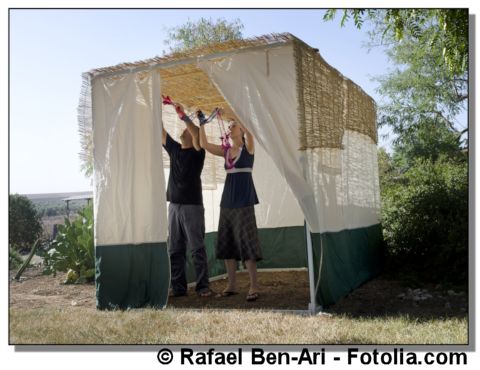Anybody want to be vulnerable?
Sukkot
For the week of October 11, 2014 / 17 Tishri 5775
Torah: Shemot/Exodus 33:12 - 34:26; Bemidbar/Numbers 29:17-22
Haftarah: Ezekiel 38:18 - 39:16
The Key to Vulnerability
And he said, "My presence will go with you, and I will give you rest." (Shemot/Exodus 33:14)
Sometimes I write my titles first. Other times it isn't until after I have completed my message. When I write them first, they often change by the time I am done as my thoughts lead me in ways I don't expect. When I wrote the title "The Key to Vulnerability," I immediately thought, "Oh no! No one is going to read or listen to it." After all, who wants to be vulnerable? Sounds dangerous. I imagine most of us want to be strong and in control. And if we're not-if we find ourselves in a vulnerable situation-we want to know how to get out of it as quickly as possible. If we can't, at least we want to know how to cope with it until then. But who wants, "The Key to Vulnerability"?
Some people do. Among them may be those who are familiar with researcher Brené Brown. Brown is renowned in the area of vulnerability. She happened upon this in her quest to understand what enables some people to live wholeheartedly. According to Brown, the only way to live life to the full is to embrace vulnerability. Vulnerability allows others to see who we really are, including our failures and weaknesses. Vulnerability allows us to feel - both the good and the bad. It's shame that gets in the way of authentic vulnerability and causes us to pretend we are something other than what we really are and numbs our feelings - both the good and the bad.
Brown's focus on shame as one of the greatest, if not the greatest, of human problems is not only insightful, it's biblical. Shame drove our first parents to hide from God rendering them powerless to face the reality of the tragic situation they created. And shame has continued to drive us ever since.
Vulnerability seems to be easy for some people. These are those whom Brown calls "shame resilient." They can laugh at themselves, quickly take responsibility for their actions, don't let failure get them down, and expect others to accept them for who they are, just as they do with others. But it appears that these people are in the minority. Most of us are not naturally shame resilient, but shame magnets. In fact, whole cultures are shame based, where one's performance has an immediate and long-lasting effect not just on the individual, but upon their family, their colleagues, and perhaps their entire country. While shame functions differently in much of the Western World, the results are similar, as shame is so debilitating regardless.
While Brown is so articulate with regard to this subject, I haven't yet found her to provide lasting help for those oppressed by shame. I think her observations are spot on, and it's helpful to get a grasp on what shame is, how it affects us, and the need for vulnerability in order to live freer and more effective lives. In what I have read, she does provide some practical tips based on what she considers shame-based vs. vulnerability-based living. But changing behavior is easier said than done. Shame is primarily a heart problem that manifests itself through our actions. Our resistance to vulnerability is due to a profound fear of ourselves, of life, and of God (not the good kind of fear of God, of course).
This week (the evening of October 8) begins the Festival of Sukkot (English: Tabernacles or Booths), which commemorates the wanderings of the people of Israel in the wilderness. The forty-year period between leaving Egypt and entering the Promised Land was a most vulnerable time. They were completely dependent upon God for everything as they were continually exposed to all sorts of dangers. This festival was designed to not only recall the years of vulnerability, but to experience it afresh, as it was required to move out of one's permanent home and live in a fragile dwelling for a week.
By bringing the people into an annual experience of personal vulnerability, they were to learn that just as God was with them in the wilderness, so he is with them in their permanent homes and their regular lives. It's easy to forget that vulnerability is not the experience of some people at certain times only, but rather the general state of us all always. Our problem is we are so afraid to be seen for the vulnerable people we really are. That's why we spend endless time and money trying to cover ourselves up, hide, and numb our pain.
The key to vulnerability is being vulnerable. But we cannot embrace that until we are convinced we can do so safely. The theme of forgiveness that is central to the two weeks prior to Sukkot is the basis of our being in God's presence without fear. We can experience forgiveness now and confidently enter God's presence because the Messiah embraced extreme vulnerability on our behalf through his shameful, sacrificial death. There's no need to hide from God anymore.
---
Unless otherwise noted, scripture quotations are from The Holy Bible, English Standard Version®, copyright © 2001 by Crossway Bibles, a publishing ministry of Good News Publishers. Used by permission. All rights reserved.
Comments? E-mail: comments@torahbytes.org
Subscribe?
To have TorahBytes e-mailed to
you weekly, enter your e-mail address and press Subscribe
[ More TorahBytes ] [ TorahBytes Home ]

